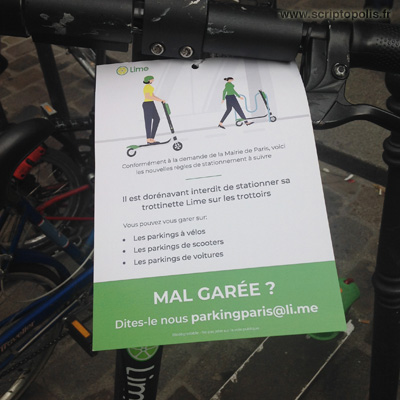Parking
Paris, May 2019.
The thin vehicle quickly became commonplace in our streets: the urban electric scooter at your disposal is the purest liberated mobility. Starting from where you want, going where you wish, by the route of your choice, with a minimum of skills, effort, investment and constraints. Symmetrically, its silhouette immediately triggered criticism from other urban residents: dangerous, invasive, polluting in its making and maintenance, so harmful that in a few months it became the subject of political conflicts a year before the municipal elections.
Too much is too much: after many complaints and op-eds, the Town Hall announces that it will take regulatory measures (bans, taxations) but that it has already spoken with companies launching their fleets in the public space. And so, a large label is attached to the neck of one of these vehicles to embody this new position of the public authorities.
As usual in this platform capitalism, everything rests on the users: their freedom of movement has not yet been curtailed, only that of parking their vehicles is limited, disturbing cars, motorbikes and bicycles in the place of pedestrian voters. But once the vehicle is picked up and launched at full speed, will the detachable label be enough to bring users into the protocol, as they have so far disregarded the fate of their frames once they are safely at destination? Or will it be necessary for companies to invent a new profession, that of flagman, which will send SMS and emails to locate badly placed vehicles as suggested in the green box?







